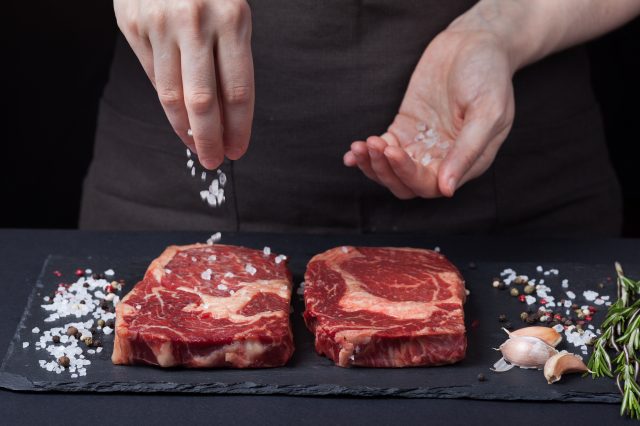Although January might be winding down and ambitious New Year's resolutions are slowly beginning to give way to cynicism, wacko toxic fad diets are still continuing to come out of hibernation to feed the needs of people who want a quick fix for slimming down. Many of these trendy yet toxic fad diets eliminate entire food groups, while some even nix food altogether. For instance, remember the dangerous Cotton Ball diet (aka the Elf Diet), where models and others looking to lose weight would consume cotton balls, like Will Ferrell's character Buddy the elf does in the film Elf? Why in Grinch's name would anyone do that, you ask? To supposedly fill up without the calories—despite also being exposed to a host of chemicals while upping the risk for a number of health complications.
Most toxic fad diets today are far less extreme than the Cotton Ball diet or, say, the tapeworm diet, or the clip-your-nose-so-you-can't-smell-your-food diet, but they can still be dangerous. At best, a fad diet might help you lose a few pounds. But they also tend to be unsustainable for long, so you'll likely put those pounds right back on. At worst, toxic fad diets could do you harm.
The Warrior Diet
This is a popular type of intermittent fasting, where you abstain from food for 20 hours a day and eat within a four-hour window at night. This is a much stricter version of the trendy 16:8 fast in which you fast for 16 hours (typically overnight) and eat during an 8-hour window, say between 1 and 8 p.m. Fasts like these may have some health benefits, but they typically result in weight loss because they restrict calories. You end up taking in fewer calories during the condensed "eating windows."
"The core of every 'diet' plan with the intention of losing weight is restriction," explains registered dietitian Lauren Chaffin, MS, RD, owner of Nourished Nutrition. "It aims to put the dieter in calorie deficit, so the body uses other reserves for energy."
This causes the body to go into a state of stress where it does everything it can to conserve energy.
"The body doesn't know the difference between a diet and a famine," Chaffin says. "In extreme restriction, the body may slow down the heart rate, metabolism, and stop producing sufficient reproductive hormones, among other things, to conserve energy." This is a protective response, but it can also be unhealthy.
The Werewolf Diet (aka the Moon Diet)

No howling involved, but you do have to keep an eye on the moon. When it's full or at a new phase, it's time for you to fast for 24 hours. Like the Fat Flush and others, only water and juice are permitted on this plan.
Here's how it's purported to work: Since the human body is mostly water, the diet allegedly takes advantage of the powerful gravitational pull of the moon to help you cleanse your body and lose weight, according to the website Moon Connection. Target weight loss: Six pounds over the course of an eerie night in the hills with your coyote brothers.
The 24-Hour Fat Flush Diet
Nutritionist Ann Louise Gittleman introduced this diet in a 2002, book and has since created spinoff weight-loss plans, a dietary supplement line, and cookbooks. The Fat Flush is a so-called "detox" plan that restricts calories to about 300 from fluid and eliminates solid food for 24 hours.
Dr. Su-Nui Escobar, RD, a doctor of clinical nutrition and owner of MenopauseBetter.com, says a 24-hour fast is not likely harm to most people except for possibly causing irritability, low energy, headaches, and brain fog. But she advises against trying cleanse or fasting-style diets.
"They are counterproductive and do not produce any meaningful change," says Dr. Escobar. "Any weight loss will come from losing water weight."
The Hollywood 48-Hour Miracle Diet
Want to lose up to 10 pounds and a few inches in just two days? This is the diet for you, according to the proponents of this Left Coast juice diet. But take heed; you're going to be hungry, and it may end up making you sick. On this diet, you drink 4 ounces of a fruit juice blend mixed with water four times a day and abstain from food and other beverages except water. You end up consuming just 400 calories a day from the juice.
"Generally, anything under 1,000 calories a day is what we call "VLCD," or very low calorie diet. It should only be done under medical supervision over short periods of time," warns Julie Upton, MS, RD, co-founder of Appetite for Health and member of our Medical Expert Board. "The lower you go in calories on a diet the more likely it will not be sustainable—so what are you accomplishing?"
The Lion Diet

If your belly's growling after a night of werewolf dieting, you may be intrigued by the lion diet, in which you eat only red meat, water and salt. It's an elimination diet designed to identify food sensitivities, decrease inflammation, and allow the gut to heal. The premise doesn't make sense since the diet eliminates foods that are anti-inflammatory and can be good for the gut like fruits, vegetables, nuts, seeds and whole grains.
"Eating any kind of meat or animal-based diet is pro-inflammatory; foods that are anti-inflammatory are almost 100% plant-based," says Upton.
"Humans are not designed to eat like a lion; this diet overtime puts your health in jeopardy," warns William Li, MD, author of the forthcoming book Eat to Beat Your Diet: Burn Fat, Heal Your Metabolism, and Live Longer. "Added salt is dangerous for people who have hypertension. High intake of saturated fat puts a strain on your metabolism and cardiovascular system."
"This diet is devoid of fiber, which is essential for regularity in the bathroom, heart health and blood sugar control," adds Dr. Escobar.
The Teatox Diet
This refers to various diet plans that have you drinking herbal teas often mixed with stimulants, diuretics, and laxatives intended to "detoxify" your body.
"Using laxatives and diuretic substances that cause you to move your bowels and urinate more frequently is not an effective way to reduce weight in any meaningful way because you are mostly eliminating water weight," says Dr. Lee. "As soon as you drink enough liquid—including the teatox products—you'll retain the weight back right away."
Check the ingredients list on teatox products before consuming, but still—drinker beware. "Since these products are not rightly regulated, there may also be hidden ingredients not listed that could potentially be harmful or cause interactions with common medications," says Dr. Lee.
The Master Cleanse

The old lemonade, cayenne pepper, and maple syrup diet keeps buzzing around social media, especially after the holidays and before beach season. The so-called detox, which was made popular years ago by Beyoncé, involves drinking six to 12 glasses of the mixture throughout the day.
"People will try this for a few days, have some success, but it's not something you can sustain long-term, so they gain the weight right back," explains Upton. "Anything that claims to be a 'cleanse' or 'detox' is a complete joke. As long as you have a normal functioning liver, that organ will do all the detoxification you need."
Final thoughts
In summary, unless it's a trendy diet that is also backed by science like the Mediterranean diet, it's best to just avoid fad diets all together.
"Find a lifestyle approach that helps you reach a healthy weight and that you can maintain for the rest of your life," says Upton.
Simply replacing processed foods with more fresh protein sources, vegetables and whole grains will put you on the path to weight loss.
"Make sure to include lean protein sources like eggs, poultry, lean beef, fish, legumes, nuts and seeds in every meal and snack," advises endocrinologist Florence Comite, MD, founder of the Comite Center for Precision Medicine & Health in New York. "Protein will satisfy your hunger longer and stabilize your blood glucose. Then build more fiber-rich vegetables and whole grains into your meals. I recommend adding a 30-minute walk after dinner, especially if you have a high-carb meal, to help usher the glucose into your muscles."
No comments:
Post a Comment